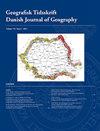水坝对河流依赖社区生计的下游影响:以加纳的Kpong水坝为例
IF 0.8
4区 社会学
Q4 ENVIRONMENTAL STUDIES
Geografisk Tidsskrift-Danish Journal of Geography
Pub Date : 2017-01-02
DOI:10.1080/00167223.2016.1258318
引用次数: 19
摘要
大坝的建设影响着沿河居民的生计。需要更多的研究来指导水坝的发展政策和管理,以保护当地河流使用者的生计。本文以加纳的Kpong大坝为例,考察了大坝对下游社区的社会经济生计的影响,该大坝建于1979年至1982年,目的是提供能源和灌溉。使用混合研究方法在重新安置和未重新安置的下游社区收集了原始数据。本案例研究强调了Kpong大坝如何影响下游依赖河流的人口,他们的生计,特别是农业和渔业,围绕着沃尔特河的季节性流量状况。我们的研究挑战了大坝增加农业生产的普遍看法,通过说明发展辅助设施,如灌溉计划,作为大坝项目的一部分,可以提高全年农业生产,改善下游家庭的粮食和收入安全,只有当缺乏农业投入等限制得到解决。为了保障生计和限制大坝的社会影响,应设计补偿方案和替代生计活动,包括受大坝工程影响的下游地区的重新安置和非重新安置社区。本文章由计算机程序翻译,如有差异,请以英文原文为准。
Downstream effects of dams on livelihoods of river-dependent communities: the case of Ghana’s Kpong Dam
Abstract Construction of dams affects the livelihoods of the population living along the dammed river. There is a need for more studies to guide dam development policies and management to safeguard the livelihoods of local river users. This paper examines the effects of dams on the socio-economic livelihoods of downstream communities by drawing on the Kpong Dam in Ghana constructed from 1979 to 1982 with the goal of supplying energy and for irrigation purposes. Primary data were collected in resettled and non-resettled downstream communities using a mixed-research approach. This case study highlights how the Kpong Dam has affected the downstream river-dependent population whose livelihoods, particularly farming and fishing revolved around the seasonal flow regimes of the Volta River. Our study challenges the general perception that dams increase agricultural production by illustrating that developing ancillary facilities such as irrigation schemes as part of dam projects can enhance all-year-round agricultural production to improve food and income security of downstream households only when constraints such as lack of farm inputs are addressed. To safeguard livelihoods and limit the social impacts of dams, compensation schemes and alternative livelihood activities should be designed to include resettled and non-resettled communities along the downstream areas affected by dam projects.
求助全文
通过发布文献求助,成功后即可免费获取论文全文。
去求助
来源期刊
CiteScore
5.20
自引率
0.00%
发文量
5
期刊介绍:
DJG is an interdisciplinary, international journal that publishes peer reviewed research articles on all aspects of geography. Coverage includes such topics as human geography, physical geography, human-environment interactions, Earth Observation, and Geographical Information Science. DJG also welcomes articles which address geographical perspectives of e.g. environmental studies, development studies, planning, landscape ecology and sustainability science. In addition to full-length papers, DJG publishes research notes. The journal has two annual issues. Authors from all parts of the world working within geography or related fields are invited to publish their research in the journal.

 求助内容:
求助内容: 应助结果提醒方式:
应助结果提醒方式:


